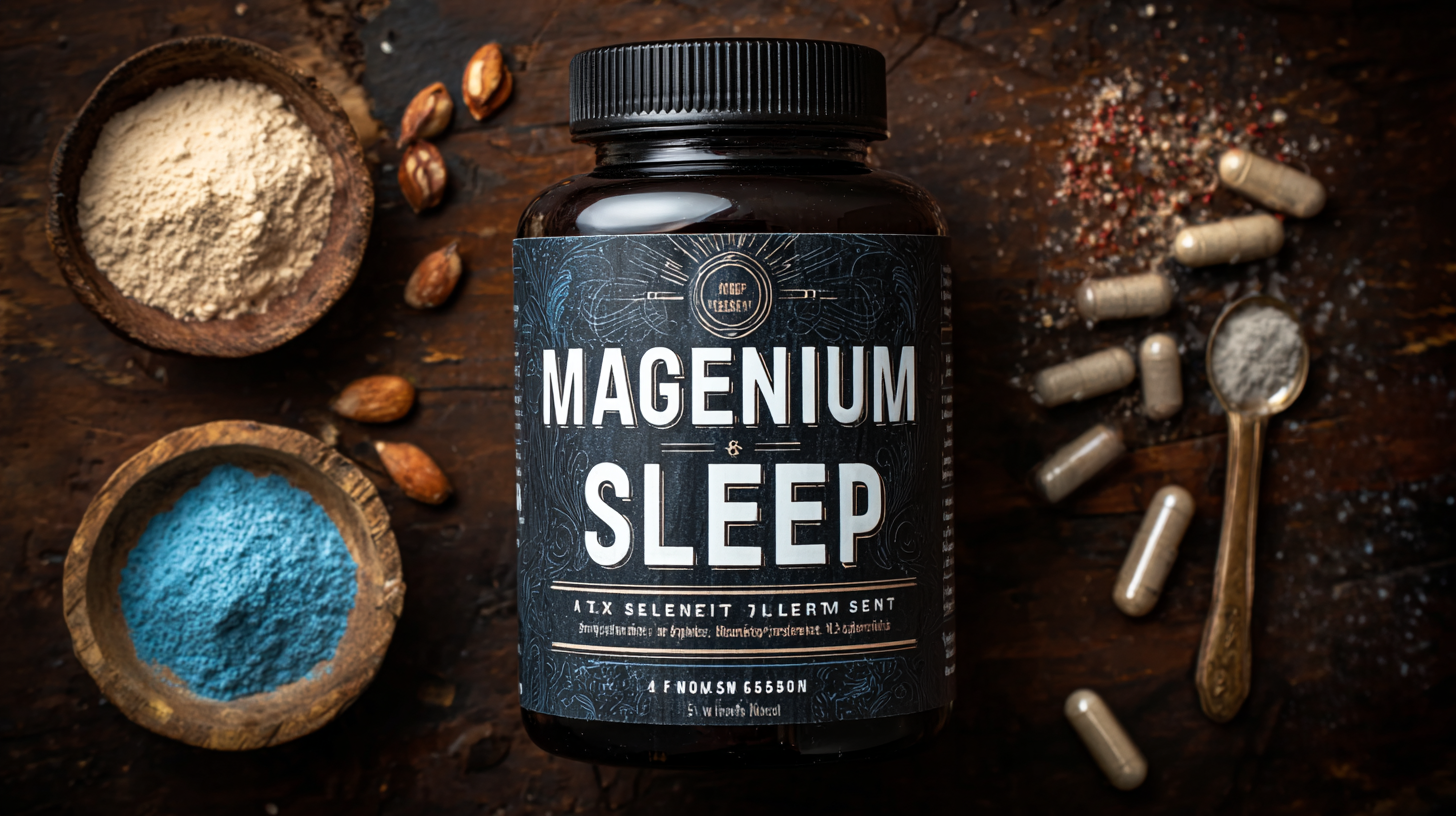
-
Home
-
Products
-
About US
-
FAQ
-
News
-
Tips
-
Contact Us
Leave Your Message
- Phone
- E-mail
- WhatsApp
- WA Business



In today's fast-paced world, achieving restful and rejuvenating sleep can often feel like an elusive goal. Many individuals struggle with sleepless nights, leading to a myriad of health issues and decreased productivity. One effective solution that has gained popularity is the Magnesium Sleep Supplement, which is renowned for its ability to promote relaxation and enhance sleep quality. This essential mineral plays a crucial role in regulating neurotransmitters that signal the brain to wind down at the end of the day.

By incorporating a high-quality Magnesium Sleep Supplement into your nighttime routine, you can potentially unlock a deeper, more restorative sleep experience. In this blog, we will explore the various advantages of choosing the best magnesium sleep supplement, focusing on its benefits, types, and how it can lead you to those coveted restful nights you’ve been yearning for.
Magnesium is often dubbed the "silent superhero" in the quest for a good night's sleep. Its role in sleep quality cannot be overstated; this essential mineral is crucial for regulating neurotransmitters that promote relaxation and the sleep-wake cycle. Research shows that adequate magnesium levels can significantly reduce insomnia symptoms and enhance sleep duration. For those struggling with anxiety or sleep disorders, magnesium supplementation may offer a straightforward solution, potentially alleviating symptoms that disrupt restful sleep.
Among the various forms of magnesium supplements, magnesium glycinate stands out for its bioavailability and calming effects. This particular form allows for easier absorption and has been linked to more effective outcomes in improving sleep quality. Studies highlight the importance of addressing magnesium deficiency, which can manifest as sleeplessness, muscle cramps, or even migraines. By incorporating magnesium into your nightly routine, you can support not just your sleep but overall health, paving the way for more restful nights and energized days.
This chart illustrates the relationship between different magnesium supplementation levels and overall sleep quality based on a 100-point scale. Higher magnesium intake is correlated with improved sleep quality, showcasing the importance of magnesium in achieving restful nights.
Choosing the best magnesium sleep supplement can significantly enhance your overall sleep quality. When looking for a supplement, it's essential to consider the form of magnesium used, as different types offer varying absorption rates and benefits. For example, magnesium glycinate is often recommended for its calming effects, while magnesium citrate may aid digestion along with promoting restfulness.
Tip: Always check the label for additional ingredients. Some supplements may contain additives or allergens that could interfere with your sleep or overall health. Opting for products with minimal ingredients can help you avoid unwanted side effects.
Another crucial aspect to keep in mind is the dosage. While magnesium is generally safe, taking excessive amounts can lead to adverse effects, such as digestive issues or fatigue. It's a good practice to start with a lower dose and gradually increase it based on how your body responds.
Tip: For personalized recommendations, consider consulting with a healthcare professional. They can help you determine the most suitable magnesium type and dose based on your individual health needs and lifestyle factors.
Magnesium plays a crucial role in enhancing sleep and promoting relaxation, making it a leading choice among sleep supplements. Studies suggest that magnesium helps regulate neurotransmitters and hormones that influence sleep patterns. According to the National Institutes of Health, approximately 50-70 million adults in the United States have sleep disorders, and magnesium supplementation has been linked to improved sleep quality in these individuals. A report published in the Journal of Clinical Sleep Medicine indicates that patients taking magnesium experienced a significant increase in total sleep time and a decrease in sleep onset latency.

Additionally, magnesium is known for its benefits beyond just sleep. It can help reduce anxiety and stress, which are common culprits of sleepless nights. Research from the Magnesium Research journal highlights that magnesium deficiency is associated with increased levels of stress hormones like cortisol, which can disrupt sleep. By incorporating a high-quality magnesium supplement into your nightly routine, you may experience a more restful night’s sleep and wake up feeling rejuvenated and prepared for the day ahead.
When it comes to enhancing sleep quality, maximizing the effects of magnesium is increasingly recommended by experts. Unlike melatonin, which can leave you feeling groggy upon waking, magnesium sleep supplements have been praised for their ability to promote relaxation and maintain steady sleep cycles. This mineral plays a crucial role in regulating neurotransmitters that calm the nervous system, making it a preferable choice for those seeking restorative sleep.
To truly harness the power of magnesium, consider incorporating it into a calming bedtime routine. Drifting off with a soothing "sleepy girl mocktail," which combines magnesium with tart cherry juice and sparkling water, may enhance its effects. Additionally, maintaining good sleep hygiene—such as establishing a consistent sleep schedule and limiting screen time before bed—can further amplify magnesium's sleep-promoting benefits. By taking these expert-approved steps, individuals can cultivate a more restful environment, ultimately leading to improved sleep quality.

While many people believe that magnesium supplements have limited effects on sleep, research debunks this myth. In fact, magnesium plays a crucial role in promoting relaxation and improving sleep quality. It helps regulate neurotransmitters that send signals to the nervous system, reducing anxiety and allowing for a more restful night. The misconception that magnesium is only beneficial for muscle cramps or energy levels overlooks its significant impact on sleep health.
Tip: To maximize the benefits of magnesium for sleep, consider taking it in the evening, ideally 30 minutes before bedtime. This timing coincides with its calming effects, encouraging a smoother transition to sleep.
Another common myth is that all magnesium supplements are created equal. In reality, different forms of magnesium—such as magnesium glycinate, citrate, and oxide—vary in their effectiveness and absorption rates. Choosing a high-quality magnesium sleep supplement can make all the difference in how well it works for you.
Tip: Look for supplements that are formulated specifically for sleep, as they often combine magnesium with calming ingredients like melatonin or herbal extracts.
| Aspect | Details |
|---|---|
| Common Magnesium Types | Magnesium Citrate, Magnesium Glycinate, Magnesium Oxide |
| Benefits for Sleep | Supports relaxation, reduces cortisol levels, improves sleep onset |
| Myths About Magnesium Supplements | 1) All magnesium forms are the same 2) Magnesium supplements are only for sleep disorders 3) It's safe to take high doses without consulting a doctor |
| Recommended Daily Intake | Adults: 310-420 mg, depending on age and sex |
| Potential Side Effects | Diarrhea, nausea, cramping |